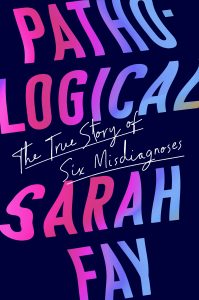Interview with Sarah Fay, author of PATHOLOGICAL
 Over the course of thirty years, doctors diagnosed Sarah Fay with six different mental illnesses: anorexia, major depressive disorder (MDD), anxiety disorder, attention deficit hyperactivity disorder (ADHD), obsessive-compulsive disorder (OCD), and bipolar disorder. PATHOLOGICAL is Fay’s gripping account of the factors that led to those diagnoses, the impact each had on her life, and the ways we pathologize human experiences. It is also a searing critique of the Diagnostic and Statistical Manual of Mental Disorders (DSM), psychiatry’s “bible,” revealing its diagnoses are subjective and not scientifically valid.
Over the course of thirty years, doctors diagnosed Sarah Fay with six different mental illnesses: anorexia, major depressive disorder (MDD), anxiety disorder, attention deficit hyperactivity disorder (ADHD), obsessive-compulsive disorder (OCD), and bipolar disorder. PATHOLOGICAL is Fay’s gripping account of the factors that led to those diagnoses, the impact each had on her life, and the ways we pathologize human experiences. It is also a searing critique of the Diagnostic and Statistical Manual of Mental Disorders (DSM), psychiatry’s “bible,” revealing its diagnoses are subjective and not scientifically valid.
Why did you write PATHOLOGICAL?
I wrote it to try to save people from going through what I went through. Pathological is dedicated to everyone who’s been diagnosed—and misdiagnosed and overdiagnosed. It’s everything I wish I’d known about the health system (I say health system because, like many people, most of my diagnoses came from primary care physicians, not psychiatrists) and the Diagnostic and Statistical Manual of Mental Disorders (DSM), the book from which all our mental health diagnoses come.
What is an important takeaway for readers?
The mental health diagnoses you and your loved ones receive aren’t scientifically valid and are rarely reliable. There’s no evidence that they’re biological, genetic, or chronic.
That isn’t bad news; it’s the truth. Mental health is complicated. Mental suffering is complex and can’t be solved by a DSM diagnosis. I live by this truth and have never been happier (yes, I’ll use that word) or more stable and in love with life, which isn’t to say I don’t feel mental and emotional pain sometimes to the point of dysfunction.
PATHOLOGICAL is both a beautiful memoir and a brilliant work of investigative journalism. Talk about how blending these components helped you simultaneously tell your story while providing important information.
I knew that the investigative journalism part of it—my exposé of the DSM—would come as a shock to readers. Many, if not most people believe that mental health diagnoses are valid. The cliché is that a mental health diagnosis is like diabetes. That cliché is well-intended in that it’s arguing for those who don’t suffer from serious mental illness (SMI) to have the right to attend to their mental health and take sick days when needed, which absolutely should happen. But the DSM diagnosis of, say, major depressive disorder (MDD) is nothing like diabetes or any other physical diagnosis that can be evidenced by an external measure. Except dementia and rare chromosomal disorders, no DSM diagnosis has a biological marker to prove it exists as a discrete disease entity, like diabetes or cancer. DSM diagnoses are based solely on self-reported symptoms and a clinician’s opinion.
In saying this, which was going to come as news to many readers, I had to back up my sources. Not only that, the information had to come from the experts. So I included over five hundred citations, even though memoirs aren’t “supposed to” have endnotes.
Mental health is a deeply complex subject. What are the challenges in writing about it?
I resolutely criticize the DSM. The goal is to make people wary of accepting and identifying with (or encouraging their children to accept and identify with) diagnoses like social anxiety disorder, major depressive disorder, OCD, bipolar II, and ADHD. But when people hear criticisms of DSM diagnoses—especially now when they’re somewhat trendy—they assume it’s a denial that psychiatric disorders exist. Let me be clear: Mental illness is very, very real. In the book, I talk about my time as a writer-in-residence in the New York City Public Schools, where I worked with students with severe mental disabilities. I also tell of how I interviewed and got to know a man who struggled with psychosis while in his teens and ended up fatally stabbing someone while in a psychotic episode. There’s no question that serious mental illness (SMI) exists. I had or have one. (I say had or have because there’s no evidence that even serious mental illness is chronic.) I couldn’t live independently for five years. I have no shame in that. I’m actually proud of it. I survived and count myself lucky to be included among others with severe mental illness, who are incredibly strong despite how others might see them.
There are parts of PATHOLOGICAL that are darkly funny. How can humor help communicate difficult subject matter?
Particularly during the darkest times—when I was suicidal—I didn’t laugh, ever. It was as if I lost the ability. While writing Pathological, humor was the only way I could access that time without being flooded with fear that I’d somehow reinhabit it.
How did writing PATHOLOGICAL help you heal?
I’m not sure writing the book healed me, but publishing it has dispelled any lingering shame I may have had. Publishing forces you to stand behind what you’ve written. If you don’t, the book won’t reach people. I stand behind every single word. Doing so has required me to accept every part of myself and my past.
Is there anything off-limits when it comes to your writing?
A lot. I’m very conscious of telling only my story, not the events of other people’s lives. For instance, I don’t talk about what my mother or sister was going through at the time. That’s private. That’s their story to tell.
There’s one exception. I do talk about what my ex-boyfriend Ray was going through as a result of the 2008 financial crisis, but he was the only person who read Pathological as I was writing it, and he gave the okay.
Your work has appeared in many publications, including The New York Times, The Atlantic, Time Magazine, and The Paris Review, where you served as an advisory editor. How did your role as a journalist impact PATHOLOGICAL?
I think I answered this above.
You use a surprising literary device in the book, a fresh and entertaining survey of the rules and history of punctuation, to illuminate how, like pathology, punctuation orders and categorizes, and tries to make sense of what’s otherwise disordered. Can you elaborate?
DSM diagnoses were intended as a way for physicians and mental health professionals to assess patients and communicate with each other. (They were never supposed to be for patients to use to reassure themselves or make sense of themselves or their lives.) Much like punctuation, DSM diagnoses were meant to clarify. But because those diagnoses are wholly subjective, it’s led to diagnostic chaos. We could argue that punctuation usage is somewhat subjective in that the rules change (hyphens, etc.), but there are rules and they serve a purpose and aid in the way we communicate and interact with each other.
What is your next project?
I’m partway through a journalistic memoir about thanatophobia, the fear of death. But now that I’m promoting Pathological, I’m considering writing the sequel about how to live a post-DSM-diagnosis life. I will say that there isn’t as much drama as there was before, and I’ll keep it that way.
—
 ABOUT THE AUTHOR: Sarah Fay’s writing appears in many publications, including Longreads, The New York Times, The Atlantic, Time Magazine, The Michigan Quarterly Review, The New Republic, The American Scholar, Bookforum, BOMB, The Iowa Review, The Rumpus, The Millions, McSweeney’s, The Believer, and The Paris Review, where she served as an advisory editor. Her essays have been nominated for Best American Essays and a Pushcart Prize. She is the recipient of the Hopwood Award for Literature, as well as grants and fellowships from Yaddo, the Mellon Foundation, the Center for Book Arts, the Poetry Center of Chicago, and the MacDowell Colony, among others. Her memoir Pathological: The True Story of Six Misdiagnoses is out now.
ABOUT THE AUTHOR: Sarah Fay’s writing appears in many publications, including Longreads, The New York Times, The Atlantic, Time Magazine, The Michigan Quarterly Review, The New Republic, The American Scholar, Bookforum, BOMB, The Iowa Review, The Rumpus, The Millions, McSweeney’s, The Believer, and The Paris Review, where she served as an advisory editor. Her essays have been nominated for Best American Essays and a Pushcart Prize. She is the recipient of the Hopwood Award for Literature, as well as grants and fellowships from Yaddo, the Mellon Foundation, the Center for Book Arts, the Poetry Center of Chicago, and the MacDowell Colony, among others. Her memoir Pathological: The True Story of Six Misdiagnoses is out now.
Category: How To and Tips, On Writing
























